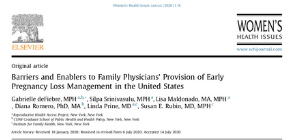Hot off the Press! An Early Pregnancy Loss Research Trifecta
 Over the past few years, RHAP has pursued a wide array of research to understand 1) the prevalence of early pregnancy loss (EPL) care offered in New York federally qualified health centers (FQHCs), 2) the barriers and enablers to providing EPL care, and 3) the effectiveness of our Miscarriage Care Initiative (MCI) to support primary care sites overcome barriers and integrate EPL care into practice. This year, all three studies have been accepted for publication into scientific journals!
Over the past few years, RHAP has pursued a wide array of research to understand 1) the prevalence of early pregnancy loss (EPL) care offered in New York federally qualified health centers (FQHCs), 2) the barriers and enablers to providing EPL care, and 3) the effectiveness of our Miscarriage Care Initiative (MCI) to support primary care sites overcome barriers and integrate EPL care into practice. This year, all three studies have been accepted for publication into scientific journals!
Here’s what we’ve learned.
In Provision of early pregnancy loss care in New York Federally Qualified Health Centers, we found that among 63 NY FQHCs that provide prenatal care:
- 9% provided expectant (“watch and wait”) management, 53.9% medication management, and 23.8% uterine aspiration. Less than one-quarter of sites provided all three EPL treatment options.
- Common barriers to providing comprehensive EPL care included: lack of clinical infrastructure, poor ultrasound access, and insufficient training.
In Barriers and enablers to family physicians’ provision of EPL management in the US, we explored this issue further by interviewing (n=15) and surveying (n=231) family physicians trained in early abortion care during residency. Of those surveyed, nearly all provided expectant management, 47.2% medication management, and 11.4% uterine aspiration for EPL. We found that:
- Their key barriers included: not enough training during residency, difficulties navigating logistics to establish systems to provide, and no/limited access to ultrasound.
- Factors that enabled providing EPL care included: seeking out extra training opportunities during and after residency, having systems already in place to provide EPL care, the presence of “clinical champions” who lead practice change efforts, and onsite ultrasound access.
Family physicians overwhelmingly believe that EPL care is a valuable and important component of family medicine. One explained:
“I don’t think that those sorts of conversations [about EPL] are able to happen as easily or tend to mean as much if they’re coming from a stranger, like a physician in the ER… To have somebody who knows [the patient] and can relate to [them] a little bit in terms of knowing [their] history, providing that reassurance and guidance… I think it means a lot to the patients we are providing services for.”
Overall, clinical training alone is insufficient to expand access to comprehensive EPL care in office-based settings. Supporting clinicians during and after residency with training and technical assistance to address barriers may expand access to comprehensive EPL care.
Lastly, in Evaluation of the Miscarriage Care Initiative, we sought to assess the effectiveness of RHAP’s MCI to increase comprehensive, patient-centered EPL care provision in primary care. We surveyed and interviewed nearly all MCI participants from 2013-2016 to learn about their experiences in the program.
- By the end of the MCI, all sites offered expectant management, 92.3% medication, and 61.5% uterine aspiration.
- Participants felt that it expanded their skills and supported their professional growth by positioning them as family medicine leaders in EPL care. And, it enabled them to offer increased continuity of care to their patients, such that patients could receive quality care with their own clinician and in the setting they felt most comfortable.
- RHAP’s MCI effectively supported primary care sites and family medicine residencies integrate comprehensive EPL care into practice.
Thanks to all of our amazing co-authors for making this research trifecta possible, especially Vicki Breitbart, Gabrielle deFiebre, Amanda Nagle, and Susan Rubin.
